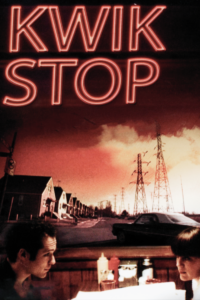
In Search of a Midnight Kiss (2007) is one of those under-appreciated indie films from the 2000s that’s now getting a revival via streaming. It’s appealing for several reasons, at least if you appreciate low-key films that emphasize characters and dialogue over action.
Alex Holdridge directed this micro- to low-budget film set in Los Angeles. It’s all about an extended date between 20-somethings Wilson (Scoot McNairy) and Vivian (Sara Simmonds), who meet on Craigslist to avoid spending New Year’s Eve alone.
There’s not too much plot to discuss, as most of the movie shows Wilson and Vivian wandering around LA. It turns out both are in an emotionally fragile space, and they alternately bond and quarrel. The meandering conversations as the pair aimlessly wander are reminiscent of Richard Linkater‘s Before Sunrise, but Holdridge inserts more volatility between the two (Linklater saved that for Before Midnight, the third in his trilogy).
Aside from the attraction-repulsion energy between the two, Vivian is contending with a possibly psychotic ex named Jack (Robert Murphy) who threatens (on the phone) to kill Wilson with a shotgun. At this point, I thought the film would take a turn similar to Something Wild (1986), where Jeff Daniels and Melanie Griffith have a wild, spontaneous date until they are pursued by the latter’s violent ex (Ray Liotta, in one of his best pre-Goodfellas roles), and the whole tone of the film turns darker. But In Search of a Midnight Kiss maintains its focus on Wilson and Vivian and Jack fades into the background.
We also get to spend some time with Wilson’s roommate Jacob (Brian McGuire) and Jacob’s girlfriend Min (Kathleen Luong), who may or may not get engaged.
If you’re an action addict or even someone looking for a feel-good rom-com, you should probably skip In Search of a Midnight Kiss. It’s an understated dramedy that underlines the fragility of modern relationships in a big city. There’s also nice footage of the city, including parts of downtown LA and East Hollywood that aren’t as commonly filmed as more touristy areas.
Apart from its other charms, the movie serves as a time capsule of a distinct moment in culture and technology right before the smartphone era. Video stores were still around, people used both flip phones and landlines, MySpace and Facebook co-existed, and websites were still novel and quirky. Vivian boasts about her own site dedicated to lost shoes. As a random piece of trivia, this website, The Lost Shoe Project, actually existed at one point.
In Search of a Midnight Kiss is currently streaming on Amazon Prime and other platforms.


